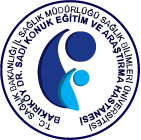ABSTRACT
Objective:
Alcohol use in patients with bipolar disorder (AUP) comorbidity is reported to be frequent. Although the validity study of MATT has been performed in Turkish; there is no spesific study in bipolar patients describing precitive diagnosis. Determining the diagnostic validity of MATT upon AUP comorbidity in bipolar patients is aimed in this study.
Material and Methods:
Structured clinical interview for DSM-IV Axis I Disorders (SCID-I) and MATT were applied to 111 bipolar patients. MATT scores were compared in two group of bipolar patients who have prior diagnosis of AUP comorbidity and those have not. Thus in order to define the AUP comorbidity in bipolar patients, required MATT cutting score for adequate sensitivity and specificity was tried to be determined.
Results:
SCID-I interview now, six of 111 bipolar patients (n=3) or past (n=3) AUP (2 patient dependency, abuse 4 patients) was to meet the diagnosis. The opener 32 in two points of alcohol dependence, 18, 17, 7 and 0 in four patients with alcohol abuse has been detected. MATT score between 0 and 7 patients who in the past, is now 17 and 18 who met the diagnosis of abuse. MATT score of five or above on the four patients, respectively. MATT scores of 5 or more (5 with five, 9 of the two, 6 and 10 with a patient) not diagnosed, nine patients diagnosed with any alcohol use disorder.
Conclusion:
Five or above MATT scores is reported to be associated with “problematic” alcohol use. However, this cut-off scores may vary in different populations both in sensitivity and specificity. When MATT cut-off scores were accepted to be above 10 in screening studies to define the AUP comorbidity in bipolar patients; specificity, sensitivity and positive predictive values were measured higher.



